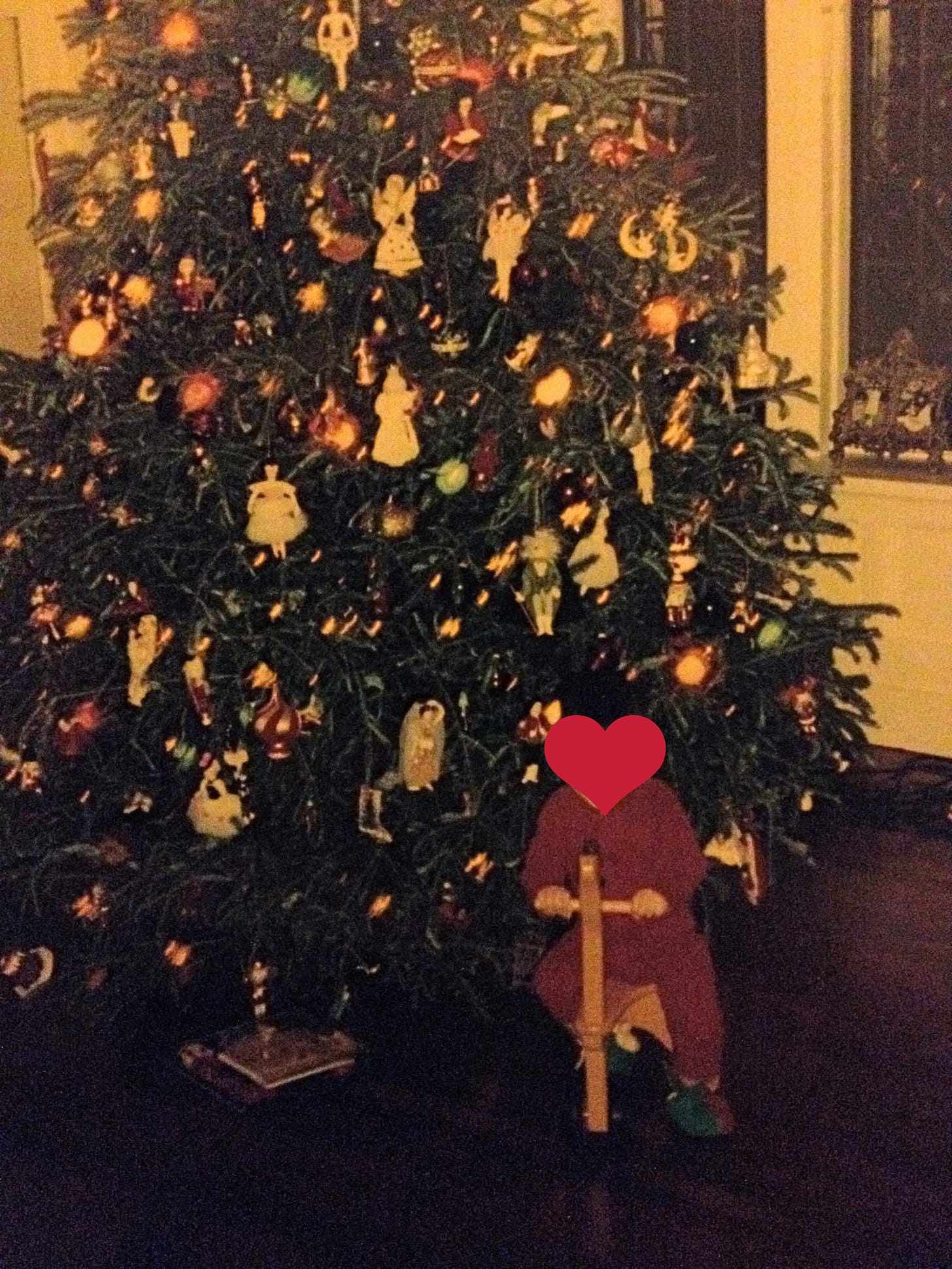You Should Lie To Your Kids About Santa
The argument for keeping Christmas magic alive with deception
***Hi there – it’s Jeff. What follows is a guest blog from Cartoons Hate Her, one of the best humor publications on Substack, which I think you should read. Over at her blog – which, again, is right here – I wrote a piece arguing against lying to your kids about Santa. So, no matter what, you have someone validating your pre-existing beliefs and someone whom you can scold as the worst parent who ever lived. Be sure to sound off in the comments section and let us know who’s who!
And I know that usually when I say “guest columnist”, it’s just me pretending to be, say, Grover Cleveland or Dolly The Cloned Sheep. But this is really her.
I was raised in a mixed-faith household. My Dad is Jewish, and my mom is…well, I can’t say she’s “Christian” because she isn’t, but she was raised Christian and is now just some secular goy. And really, I only kept the “Jewish” label for my dad because it’s a cultural identity; he hasn’t been to a synagogue since the moon landing. As a cultural and ethnic half-Jew, I inherited the best of both worlds: OCD and the ability to digest dairy. But growing up with “two religions” meant I really grew up with no religion at all.
This meant that for me, Santa was a completely secular folklore character (if my parents really wanted to ham up the “mixed faith” thing, they could have made him a Larry David type character who was always eating reubens while delivering gifts.) The same secular characterization was applied to the Easter Bunny. From an early age, I acknowledged the Easter Bunny was clearly fake because the concept was too absurd. My father regaled me with stories of an equally obviously-fake “Birthday Bunny” which irritated my mother because “she might start asking questions about the Easter Bunny, and maybe Santa is next.” But Santa was believable in a way that the Easter Bunny wasn’t. And my parents (especially my mom, who despite not being religious was extremely pro-Christmas) did whatever they could do keep this deception going. I’m glad they did.
For one, my parents’ deception was made easier by the fact that all of society aided them in their ruse. Children’s movies always implied, or directly stated, that Santa existed. Sure, I also heard that Santa didn’t exist, but it didn’t faze me. I grew up in a very Jewish neighborhood, and I went to school with many Jewish kids who told me Santa was made-up. I figured Santa just didn’t like them enough to give them presents—he’d hardly be the first historical figure to harbor some casual antisemitism.
But around age six, I started to wonder about Santa. And my parents had clever rebuttals for all of my arguments.
Why does the Santa at Macy’s look different from the other Santa I met at the mall?
Some mall Santas are actually elves, but they all pass the toy wishes back to Santa.
Why did Santa buy me a Barbie, which I know is made in the Mattel factory?
Santa shops too! Not all his toys are from the workshop.
How does Santa get to everyone’s house in one night?
Well, Santa travels lightning-fast and he also employs proxy elves to help him.
The “elves,” as it turned out, were a very clever way to explain away Santa’s abilities or lackthereof. Anything that wasn’t plausible for one man to do was possible with the help of “elves.” And that was good enough for me. I wanted to believe the answers because I wanted Santa to be real.
You might be wondering: if you wanted Santa to be real so badly, weren’t you devastated when you found out he wasn’t real? And the answer is no. Mostly because by the time I figured it out—around age seven—my parents didn’t have to break the news to me. I just knew. And by then, I was fine with it, because I had a much younger brother who was still in puppy-eyed awe of Santa. Now that I saw the magic of Santa through a younger child’s eyes, I was eager to be on the team of the Liars. I hatched a new plan: now that Santa was no longer part of my inner world, I would take part in perpetuating the deception so my little brother could enjoy Santa the way I did.
For years, I reveled in making Christmas magic for my little brother. But when he got to be around six, I realized that he was starting to doubt Santa’s existence. Perhaps out of a desire to prolong the magic—or just the classic big sister instinct of “wanting to trick my little brother,” I made him a big-ass card “from Santa” declaring that he was, objectively, the “best little boy in the world.” Given that he was a bit of a smart ass, he was eager to believe such a ridiculous premise. Not only did he keep the card in his bedroom for several years, but he dragged it out every time he got in trouble because he was “the best little boy in the world, according to Santa.” This was especially inconvenient when I was the one who was mad at him.
I asked my brother about this recently (he’s almost thirty now) and he confirmed that this card was the main driver that prolonged his belief in Santa, especially because it was the first of several catfish correspondences from Kris Kringle. I continued writing him cards from Santa, once whispering “as Santa” in his ear when he was sleeping in hopes that I could pull an Inception on him.
Unfortunately, my plan worked a little too well. My brother was a true believer. And while most kids kind of figure things out around six or seven, my brother kept believing. My mother, who was primarily responsible for the Santa lore, was getting tired of keeping up the charade. She hoped she could gently blackpill him on Santa by pulling the Tucker Carlson strategy of “just asking questions.” One night, as she read Twas the Night Before Christmas to him, she pondered aloud, “Wow! Santa sure does go to a lot of places every single Christmas Eve! How do you think that’s even possible?” My brother solemnly said, “Santa can do anything.” Toward the end of the book, when Santa flies away into the night sky, my brother affirmed, “What a brave man.”
My brother eventually realized that Santa wasn’t real, but clung to the story, mostly because he was afraid that if he openly stopped believing, he wouldn’t get presents anymore (given that I was still getting presents, this means he must have assumed that I, a thirteen-year-old, was still 100% Santapilled.) Around nine or ten, he dropped the Santa act entirely, and so did the rest of the family. The Santa era was over.
I’m glad I lied to him about Santa, I’m glad my parents lied to me, and I now lie to my kids (about Santa, but also about other things, such as YouTube “being broken” or the buffet having a “three cookies per child rule.”) Lying isn’t great, but my logic is that by the time they realize you’re lying about Santa, they’re old enough to mostly be grateful for the fact that you kept the ruse going for so long. And if they’re anything like me, becoming a Santa Atheist might free them up to join the grownups in keeping Santa alive for any younger siblings.
Given that my brother’s belief in Santa (and subsequent bubble-popping) was arguably the type that might one day be seen as traumatic (he was elaborately gaslit and catfished for years,) I thought he might disagree with me about the magic of Santa. He wants kids of his own someday, and he plans to celebrate Christmas, so I asked him if he planned on lying to his kids about Santa, given his own history.
He said, “Of course.”








Wait... You're telling me YOU write most of the "special" guest columns?
Wow. Thanks a lot. Christmas is officially ruined now.
Well it fits. An age old debate wrapped in a cross pollination scheme to promote a Substack to a different audience. And if you get a few extra subscriptions? Genius! Win win!
Lucky for us CHH is a good writer.
I already subscribe to her. Her Sunday posts about Twitter wackiness is a treat!
I wonder what Grover Cleveland thinks about this.....